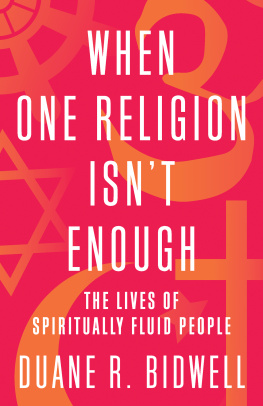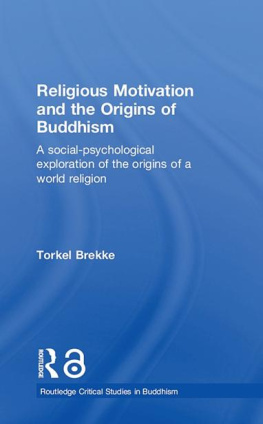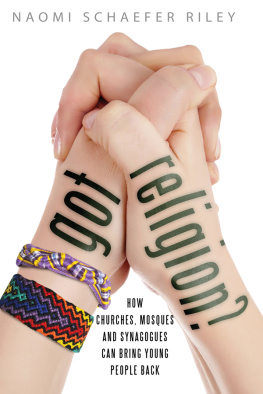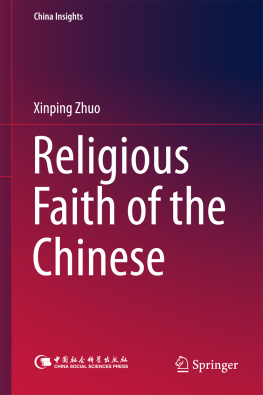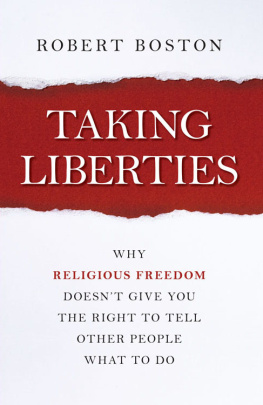Table of Contents
Pagebreaks of the print version
Guide

For Karee,
again
INTRODUCTION
or, Where I Stand
W HEN NBA PLAYER JOAKIM NOAH a center for the Chicago Bullsisnt on the basketball court, he wears a Christian crucifix and Muslim prayer beads. Some days he also sports an Ethiopian cross made with Tibetan Buddhist stones. I believe in God, Noah says, but I wont say that Im a certain religion. I think Im a little bit of everything. In The Life of Pi, a best-selling book and an award-winning film, the main character calls himself a practising Hindu, Christian and Muslim.
Religious multiplicitythe experience of being shaped by, or maintaining bonds to, more than one spiritual or religious community at the same timeis occurring more frequently in the United States and Europe. In other parts of the world, religious multiplicity has long been a norm. As more and more people transgress religious boundaries, this multiplicity becomes more visible. We increasingly encounter spiritually fluid people in public life, at school, at work, at backyard cookouts, and at the health club. Spiritually fluid people evoke prejudice and curiosity, uncover assumptions, and disrupt our typical labels; they undermine religious authority, complicate religious communities, and blur social categories. Their lives question ordinary assumptions about pure, static, and singular religious identities. Above all, spiritually fluid people spark questions: How and why does someone become spiritually fluid? Are spiritually fluid people simply confused, syncretistic, unable to commit? Are they idolaters? How should we make sense of spiritually fluid people? Do they belong in our religious and spiritual communities? What might they teach us? And what do complex religious bonds imply about our own religious and spiritual identities, practices, and commitments?
This book explores multiple religious bonds as a human experience. It describes religious multiplicity rather than evaluating it. It asks how people come to claimor be claimed byreligiously multiple identities, practices, and lives. And it concludes that religiously multiple people belong among us. Their visibility and voices bring gifts to benefit our communities and our common life.
The lives of spiritually fluid people pulse with complexity and contradiction. One persons experience could never exhaust what it means to be formed by two or more religions. By necessity, then, this book includes contradictory voices. Those voices tell stories and make points far different from mine. I celebrate these differences.
Still, no writer can transmit another persons stories without shaping them. A retold story never comes to readers in as pure a state as when the original storyteller entrusted it to a writer. We tell stories, even other peoples stories, for our own purposes. We make them do what we want. Because the stories in When One Religion Isnt Enough have percolated through my mind and intentions, theyve absorbed meanings and flavors that werent there at first. Even if I quote someone directly, youre not hearing the tale the way the person would tell it; youre hearing my account of the experience. This translation process scares me a bit: telling other peoples tales is a privilege. They entrust their words, thoughts, and feelings to me, and I can distort these even without trying.
Nonetheless, Im accountable to the people who shared their stories with me. Im also accountable to readers. Throughout the book, Ive tried to conveywith accuracy, responsibility, and sympathythe voices of spiritually fluid people. I know many through friendships, research, counseling, and spiritual direction. Ive also tried to convey the ideas and voices of scholars who think and write about the topic. My intention is to create a thoughtful and reflective book, one that doesnt tell people what they should think or experience but takes a clear stand when it seems necessary. I rarely made judgments about which beliefs or ideas are the most true or legitimate. Nonetheless, I disagree with certain voices in the book. So it seems important to clarify a few of my beliefs.
WHERE I STAND
I am Buddhist and Christian. Jesus is my savior, and the Buddha is my teacher. Jesus restores me over and over again. He gives life. He heals (although not usually all at once), and sometimes that healing can be painful. Jesus asks me to be honest with him, to be present to him, and to agree to measure my life against his. For me, Jesus is divinity con carne, holiness with meaty ribs, an ultimate reality that breathes and sweats and feels. He enables me to see and hear and feel and understand Mystery with a capital M, by which I mean the ultimate sources, identities, meanings, and truths that orient human lives and give them meaning. I am Christian primarily by Gods action and invitation. I affirmed that identity through baptism, but I did not request or choose it. God acted first.
But its hard for me to follow Jesus. I need a schematic, a rational step-by-step guide to waking up to Mystery. Jesus doesnt provide that. The Christian Bible, after all, isnt a users manual or a book of rules; its a collection of vignettes, a gathering of voices. Attempting to live like Jesus requires art, not science: he teaches with metaphors and parables, not flow charts. Jesus just doesnt provide a well-marked trail you can follow directly to your final destination.
This is where the Buddha comes in. His teaching is coherent. He provides a precise eight-step path toward awakening and an overarching account of reality, or metaphysic, that fits a Western scientific worldview. (The philosopher Alfred North Whitehead once saidsomewhat too neatly, I thinkthat Buddhism is a metaphysic in search of religion, while Christianity is a religion in search of a metaphysic.) I am Buddhist primarily by choice. Receiving nourishment from both traditions satisfies my longing for both a metaphysic and a religion. It gives me wise teaching and loving practices, a holy relationship, and a path to awakeningsustenance I wouldnt have if I were only Christian or only Buddhist.
Yet my connection to Buddhism isnt only pragmatic or instrumental. It claims me emotionally, too; I am more apt to feel tearful or joyful when chanting at the temple than when I am worshipping in church. Buddhism changes the way I know and experience God. It broadens and deepens my understanding and experience of Christianity. Likewise, Jesus helps me understand more fully why the Buddha insisted that virtue, meditation, and wisdom must be linked. Jesus calls me to action in the world in ways the Buddha does not. I have a relationship with God; I have admiration for the Buddha.
I dont need to justify my complex religious bonds. (In fact, not needing to defend themselves is a fundamental right of spiritually fluid people.) But I do want to position myself philosophically and theologically so that readers know where my feet are planted. My stance shapes what I see in the landscapes of this book.
First, Ive written this book without making a sharp distinction between religion and spirituality. They are different and yet not different, distinct and closely related. Both can be life-giving. In general, I think of religion as the formal structures and practices that shape a communitys relationship to Mystery and to the world. As such, religions carry and speak with authority to particular communities that identify as part of the tradition. Religions are public expressions of a communitys values, practices, and understandings. Spirituality overlaps with religion but tends to be local and idiosyncratic. It expresses a persons way of relating to Mystery through rituals, prayers, physical movements and postures, spiritual disciplines, beliefs, values, commitments, relationships, and other ways of connecting to the sacred while running errands, raising a family, and figuring out the meaning of life. Sometimes, spirituality works through religious structures, communities, and traditions, but often it functions apart from them.

